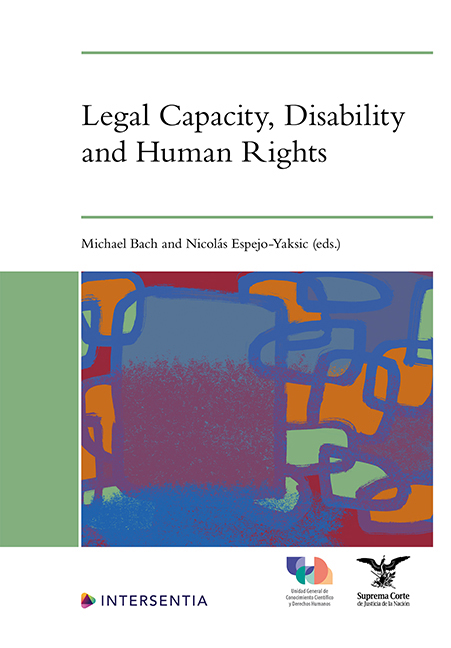Book contents
- Frontmatter
- Foreword
- Acknowledgements
- Contents
- List of Cases
- List of Contributors
- Legal Capacity, Disability and Human Rights: Introduction
- PART I HISTORICAL PERSPECTIVES AND THEORETICAL FRAMES
- PART II LAW REFORM: COUNTRY AND REGIONAL PERSPECTIVES
- PART III LEGAL QUESTIONS, PERSISTENT CHALLENGES
- Index
- About the Editors
Legal Capacity in Canada: An Equality Rights Analysis in Light of the Canadian Charter of Rights and Freedoms and the Convention on the Rights of Persons with Disabilities
Published online by Cambridge University Press: 03 April 2024
- Frontmatter
- Foreword
- Acknowledgements
- Contents
- List of Cases
- List of Contributors
- Legal Capacity, Disability and Human Rights: Introduction
- PART I HISTORICAL PERSPECTIVES AND THEORETICAL FRAMES
- PART II LAW REFORM: COUNTRY AND REGIONAL PERSPECTIVES
- PART III LEGAL QUESTIONS, PERSISTENT CHALLENGES
- Index
- About the Editors
Summary
INTRODUCTION
Article 12 of the Convention on the Rights of Persons with Disabilities (CRPD) has fuelled disability advocacy, law reform and community organising efforts in countries world-wide with the goal of ensuring that laws, policies and practices live up to the vision of equality in the exercise of legal capacity for people with disabilities. Article 12, paragraph 2, requires that States Parties recognise “that persons with disabilities enjoy legal capacity on an equal basis with others in all aspects of life”. This paragraph is frequently cited by disability advocates to substantiate their claim to a right to control their own lives and to resist any attempt at interference with their decision-making, through legal avenues such as guardianship and other forms of substitute decision-making. Because of the exclusion that many people with disabilities face and the historical restrictions on their autonomy resulting in an affront to their dignity, their claim has been hard fought for, but largely unrealised in jurisdictions internationally.
Understanding what is required to achieve Article 12's ideals demands an in-depThexploration of what is meant by the enjoyment of legal capacity on an equal basis. While equality, and the related concept of discrimination, are well understood in other contexts, such as physical accessibility, it is less clear what they mean in the context of legal capacity. What characterises a legal capacity law as discriminatory? In order to effect change, we must first be able to identify the problem with sufficient precision to guide action. This chapter explores legal capacity through an equality lens, based on the equality right in the Canadian Charter of Rights and Freedoms (Charter) and the CRPD.
The experience in Canadian law is examined to demonstrate one method of undertaking an equality rights analysis. Canada is an apt jurisdiction for this case study as Canada was the lead State Party at the United Nations in the development of Article 12. As described by Julian Walker, and citing a joint paper by the Council of Canadians with Disabilities and the Canadian Association for Community Living, “Canada's strong contribution to the CRPD allowed certain Canadian values to be enshrined in international human rights law.”
- Type
- Chapter
- Information
- Legal Capacity, Disability and Human Rights , pp. 353 - 374Publisher: IntersentiaPrint publication year: 2023



